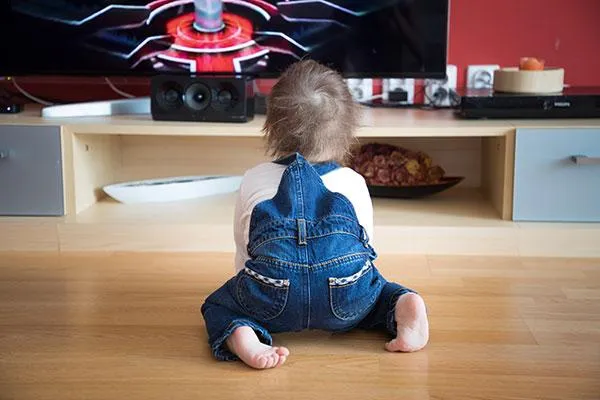“Teachers open the door, but you must enter by yourself.”

Screen Time For One Year Olds
Insights on Screens and Toddler Development Delays.
“This is an important study because it identifies specific developmental skills that are affected by babies having lengthy exposure to screen time .”
This past week, JAMA (Journal of American Medical Association) Pediatrics reported on the results of a study regarding babies being exposed to screen time as one-year-olds. This rare study showed that babies at age one who are allowed 1 - 4 hours per day of screen time are more likely to have developmental delays in communication, fine motor, problem-solving, and personal and social skills as toddlers! Yikes!
“This is an important study because it identifies specific developmental skills that are affected by babies having lengthy exposure to screen time .”
Introduction:
On 18 September, 2023 JAMA (Journal of American Medical Association) Pediatrics reported on the results of a study regarding babies being exposed to screen time as one-year-olds. This rare study showed that babies at age one who are allowed 1 - 4 hours per day of screen time are more likely to have developmental delays in communication, fine motor, problem-solving, and personal and social skills as toddlers! Yikes!
Study: Screen time for babies linked with developmental delays in toddlerhood
In a recent study published 18 September, 2023 in JAMA Pediatrics, babies at age one who are allowed 1 - 4 hours per day of screen time are more likely to have developmental delays in communication, fine motor, problem-solving, and personal and social skills as toddlers.
That means that the easy solution to distract a baby by handing them a phone or tablet to watch can affect their development. This study is important because it shows specific developmental delays and, before now, there have not been many prior studies that have enough follow-up data to show this is the case. Impacts of screen exposure on very young children is relatively understudied.
How the study was conducted: Children and their mothers were part of the Japan-based Tohoku Medical Megabank Project Birth and Three-Generation Cohort Study that recruited from 5- obstetric clinics and hospitals in two Japanese (Jiyaki and Iwate prefectures) areas from July 2013 - March 2017. The data was collected voluntarily as parents self-reported their actual experience.
Here’s what the study results found:
Those babies who spent four or more hours per day with screen time were 4.78 times more likely to have underdeveloped communication skills, were 1.74 times more likely to have subpar fine motor skills, and two times more likely to have underdeveloped personal and social skills by age 2. By age 4, the risk remained only in the communication and problem solving categories. But still, that is a huge developmental loss that can be difficult to make up.
Implications:
The potential harms of screen time on communication skills may have more to do with children being cheated out of opportunities for language development since watching a screen doesn’t allow an opportunity for interaction and expression. It also takes away from building of relationships and nurturing neurological pathways that impact communicative development.
One other point that can be made from these results is that by children NOT being entertained every minute can help them learn to become more observant of the environment, can learn to self-regulate their boredom, and it opens a space for the child’s own creative thoughts and endeavors
Bottom line: Personal interaction is key to a child’s development - starting with babies. The more time you spend talking to and interacting with your child, the higher their vocabularies will be, and apparently it will help with communication, social interactions, and fine motor skills in toddlers and preschoolers.
Now, If you give babies something to watch on screens occasionally, make sure they are seeing things that make sense to them such as Baby Einstein videos that don’t have jerky movements but have smooth pictures with long transitions. I think videos that have quick flashes of movement that flick between shots are disruptive to the brain. If you must, be intentional about what you select, but make up for lost time by interacting with your child at other times so that they can benefit from that interaction.
Checklist for Parents on Screen Time and Child Development:
Remember imperfect action beats inaction, get started and keep empowered.
Limit Screen Time: Ensure that your baby is not exposed to excessive screen time.
Monitor Screen Content: If you choose to allow screen time occasionally, select age-appropriate and educational content.
Avoid Jerky Movements: Opt for videos with smooth pictures, long transitions, and avoid content with quick flashes of movement that may be disruptive to the developing brain.
Prioritize Personal Interaction: Recognize that personal interaction is crucial for a child's development.
Be Mindful of Developmental Milestones: Watch for potential signs of developmental delays in communication, fine motor skills, problem-solving, and personal and social skills as your child progresses from infancy to toddlerhood.
Encourage Observational Learning: Allow your child time for unstructured play, enabling them to observe their environment, self-regulate boredom, and foster creative thoughts and endeavors.
Understand Implications of Screen Exposure: Acknowledge that potential harms of screen time on communication skills may stem from missed opportunities for language development, interaction, and expression. Be aware of the impact on building relationships and nurturing neurological pathways crucial for communicative development.
Participate in Child Development Studies: Stay informed about relevant studies and research on child development, such as the Japan-based Tohoku Medical Megabank Project Birth and Three-Generation Cohort Study, to guide your parenting decisions.
Balance Screen Time with Other Activities: If screens are used, balance them with other activities that involve personal interaction, exploration, and play to ensure a well-rounded developmental experience for your child.
Prioritize Personal Interaction Over Screens: Understand that personal interaction is key, even in the age of technology. Actively engage with your child, fostering a strong foundation for communication and overall development.
Remember, each child is unique, so these guidelines are meant to be general recommendations. Pay attention to your child's individual needs and cues, and consult with pediatric professionals for personalized advice if needed.
12 November, 2023

Deanne Spencer, M. Ed.






